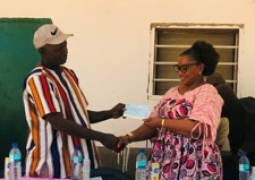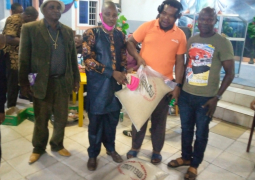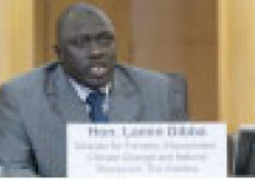
World Aids Day is commemorated on December 1st to recognise communities and their crucial role in shaping the response to HIV and global health. It is also a moment to measure the progress made thus far and to raise awareness about the remaining challenges to ending Aids by 2030.
The theme for this year’s event is ‘let communities lead’.
Welcoming the gathering, Adama Drammeh, director National Aids Secretariat, described the day as a moment to measure the progress made thus far and to raise awareness about the remaining challenges to ending Aids by 2030 and encourage everyone to join forces to make sure the HIV response is successful.
The annual event, she added, also reminds us all of the global fight to end the stigma related to HIV, honour those we lost and motivate us to keep working until HIV is no longer a public health threat.
“Today, there are effective treatment for HIV with antiretroviral (ARVs) that supress the virus causing AIDS. Despite this achievement, many new infections happen each year because some people still don’t know how to protect themselves, mainly due to stigma and discrimination against people living with the HIV.”
She made reference to UNAIDS data which indicate that about 30 million out of the 39 million people living with the virus worldwide are receiving live-saving treatment, acknowledging that access to HIV treatment has prevented nearly 21 million AIDS related deaths in the last three decades.
The world, she added, is doing well in slowing down the spread of HIV and AIDS related deaths, but communities must not become complacent. “We need to intensify efforts to end the HIV Pandemic.”
She maintained that successful HIV response need strong political leadership, addressing inequalities, involving communities and organising and ensuring enough sustainable funding.
Drammeh made refence to Botswana, Eswatini and Rwanda and the United Republic of Tanzania and Zimbabwe for their headway in reaching 95-95-95 targets and at least 16 other countries are close to reaching them.
She called on all to show solidarity and compassion to those affected by HIV, work toward ending inequalities and AIDS and ultimately end the pandemic.
For her part, Sira Ndow UNAIDS country director, reminded that in this year’s commemoration, the UNIAIDS is calling for urgent support to let communities lead in the fight to end AIDS.
“We are shining a light on how community-led interventions are central to enabling the end of AIDS as a public health threat. The world can end AIDS with communities leading way. Organisation of communities living with, at risk or affected by HIV are the frontline of progress in the HIV response.”
She spoke highly of how community-led interventions could make a difference in ending the alarming menace. She however, lamented that communities have been held back in their leadership due to funding shortages, capacity constraints, and crackdown on rights advocates among a host of others.
For her part, Mam Kumba Ndow-Ceesay, programme manager at Action Aid International-The Gambia (AAITG), lauded the heroic efforts of people living with the virus, acknowledging that they have striven to prove that the virus is like any other chronic illness.
She equally commended the support by health care providers for their dedication to the fight against the virus.
“As we raise awareness today, we also want to show solidarity in the face of the pandemic.”
She explained that despite the challenges with HIV, they have registered some successes in terms of uptake of HIV treatment and prevention services in the country.
She, however, revealed some lapses that need urgent intervention and that they are working to improve on those areas.
Pa Ousman Bah, programme manager at the National AIDS Control Programme Gambia (NACP), revealed some the statistics and strategies they are currently implementing.
He disclosed that HIV prevalence rate in the country stands at 1.5% based on the national 2020 sentinel survey and that there over 26,000 estimated number of people living with the virus in the country.
“We are able to diagnose only 51% of this figure, which is around 14,000 people. For those on treatment, we are able to put about 61% of those who were found to be positive on treatment.”
He noted that their target is to put 95% of those people diagnosed with virus; putting 95% on treatment and making sure 95% viral suppression of those on treatment.





